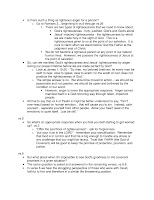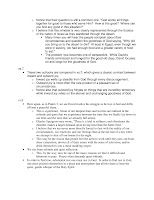vs.1-2
- The circumstances surrounding Psalm 4 are similar to those of Psalm 3. However, things had simmered down, for Absalom failed to follow up his initial advantage and David had time to recruit forces of his own.
- The tone of this Psalm and the gentle, instructive nature with which David speaks, suggests that this Psalm is more personal in nature and, given the circumstances, may very well be David's prayer and instruction for his wayward son Absalom.
- This application would give some clarity to the idea of David's glory considering that the glory of an earthly father was in his name and carried through to the first born son, the heir.
- "How long will you love worthlessness" - is speaking of David's perception of his earthly royal power and position.
- To David, who came from obscurity into the throne of Israel, the position of king was something fleeting. Given one day and gone the next.
- Absalom's desire was to be king, to possess David's throne and scepter.
- In the second part of vs.2 David pleads with his son to see the foolishness of his own desire.
vs.3
- vs.3 holds in it the doctrine of sanctification. Sanctification is separation from ungodliness and separation to God.
- What does it mean to be separated to God?
- Think of it in terms of a can of green beans at the grocery store... there are hundreds of cans of vegetables on the shelf at the grocery store. But when you go into the store to buy vegetables you only select one can of one type of vegetable.
- Then you purchase the can, with your money which you earned.
- After paying for this can of vegetables they are completely and fully yours to do with as you please. They've been separated from the rest of the cans at the store, you can't take any of those cans home with you because they don't belong to you.
- But your can is separated from every other can to you... to your home, to your shelf, to your will.
- This is a simple illustration of what sanctification means in relationship to God and the individual.
- You have been separated from the lost, you have been purchased through the payment of Jesus' blood, you now belong to God. He has possession and ultimate control over you.
vs.4
- "be angry" - is a phrase translated from the Hebrew word "ragaz" which literally means, to be agitated, quiver, quake, be excited, and/or perturbed.
- And note what follows this first sentence of Psalm 4:4... it's essentially, "calm down, be still, think about what your doing before you end up doing something destructive.
- Is there such a thing as righteous anger for a person?
- Go to Romans 3... beginning in vs.9 through vs.26
- There are two types of righteousness that we need to know about.
- God's righteousness - holy, justified, God's and God's alone
- Jesus' imputed righteousness - the righteousness by which we are made holy in the sight of God. This is a righteousness given to us at the point of our salvation. It is ours to claim when we stand before God the Father at the judgment seat of Christ.
- We do not become a righteous person at any point of our natural human lives. However, we possess the righteousness of Jesus at the point of salvation.
- So, can we manifest God's righteousness and Jesus' righteousness by anger during our present lifetime before we are made perfect by God?
- Look at James 1:19-20 - "So then, my beloved brethren, let every man be swift to hear, slow to speak, slow to wrath; for the wrath of man does not produce the righteousness of God."
- The simple answer is no. We should be moved to action... we should be passionate and not passive, we should be upset and bothered by the condition of our world.
- However, anger is never the appropriate response. Anger cannot manifest itself in a God-honoring way through fallen, imperfect people.
- All that to say that vs.4 of Psalm 4 might be better understood to say, "Don't over-react based on human emotion... that will cause you to sin. Instead, calm yourself... separate yourself from other people. Allow your heart (seat of the emotions) to quiet itself. Just be still."
vs.5
- So what's an appropriate response when you feel yourself starting to get worked up? vs.5
- "Offer the sacrifices of righteousness" - ask for forgiveness.
- "put your trust in the LORD" - remember your sanctification. Remember that God is in control and that He is big enough to handle any stress or any challenge that you might be facing. Trust that YHWH (the God of Covenant) will be good to keep His promise of protection, provision, and justice.
vs.6
- But what about when it's impossible to see God's goodness to His covenant promises in a given situation?
- The same question is asked and answered in the remaining verses, vs.6-8.
- In verse 6 we hear the struggling perspective of those who were with David, faithful to him and therefore in a similar life threatening position.
- Notice that their question is still a common one, "God works all things together for good to those who serve Him? How is this good? Where can you find any good in this situation?"
- I believe that this mindset is very clearly represented through the Exodus of the nation of Israel as they wandered through the desert.
- Many times you will hear the people complain about their circumstances and question the goodness of God saying, "Why did you bring us to the desert to die? At least in Egypt, even though we were in slavery, we had enough food and a greater variety of food to eat."
- The problem now becomes one of perspective. While David's friends reminisced and longed for the good old days, David focuses on and longs for the goodness of God.
vs.7
- These two outlooks are compared in vs.7, which gives a classic contrast between inward and outward joy,
- Inward joy wells up steadily from God through every discouragement.
- Outward joy is most often the rare product of a pleasant set of circumstances.
- Notice also that outward joy hinges on things that are incredibly temporary while inward joy relies on the eternal and unchanging goodness of God.
vs.8
- Here again, as in Psalm 3, we see David resolve his struggle as he lays in bed and drifts off into a peaceful sleep.
- This is significant. Some of our deepest fears and worries are realized in the solitude and quiet that we experience between the time that we finally lay down in our beds and the time that we actually fall asleep.
- Charles Spurgeon once wrote, "There is a trial in stillness; and oftentimes the chamber makes a larger demand upon loving trust than the battle field."
- I believe that we are never more directly forced to deal with the reality of our circumstances, our reactions, and our feelings than at the tail end of a day when we attempt to shut off our brains for the night.
- This may be the reason that people feel the need to work until they pass out from sheer exhaustion, drown all of their issues with the noise of television, and/or drink themselves into a mind numbing stupor.
- We run from solitude and quiet reflection.
- This, by the way, may be one of the many reasons we find it difficult and laborious to pray. Prayer often demands quiet solitude.
- In order to find true, substantial rest one must rest in God. In order to find rest in God, one must position themselves in a place and atmosphere that allows them to hear the quiet, gentle whisper of the Holy Spirit.







